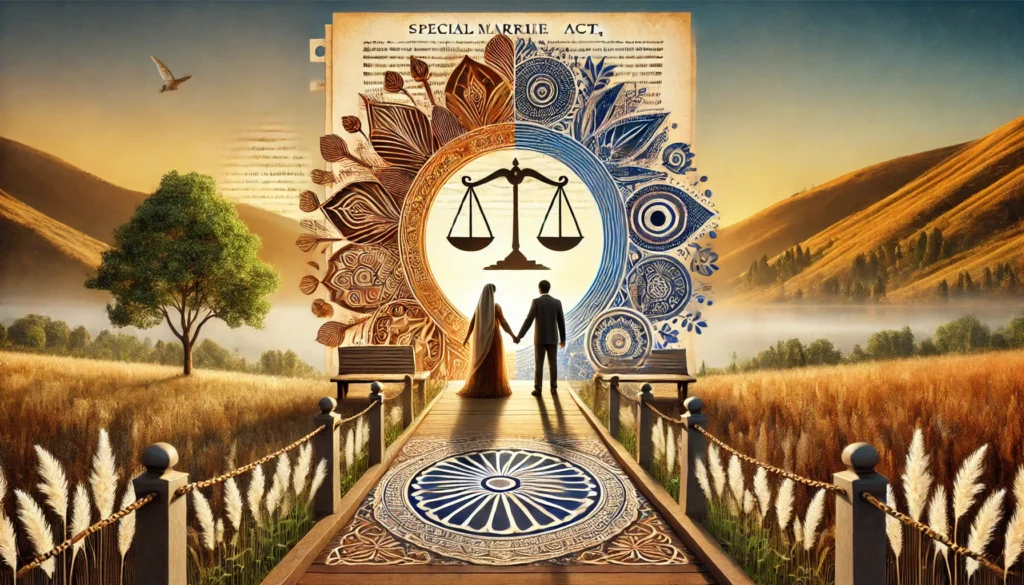Special Marriage Act 1954

Understanding the Special Marriage Act 1954: A Comprehensive Guide
The Special Marriage Act 1954 is a landmark legislation in India that governs civil marriages, transcending religious and cultural boundaries. This act provides a legal framework for solemnizing and registering marriages between individuals of different religions, castes, or communities, promoting secular values in the country. Here’s an in-depth look at its significance, legal context, and notable judgments.
What is the Special Marriage Act 1954?
The Special Marriage Act 1954 is a central legislation that facilitates civil marriages in India. Unlike other personal laws, it provides a secular framework for marriage, allowing individuals to marry irrespective of their religion or caste.
Key Features:
- Eligibility: The bride must be at least 18 years old, and the groom must be 21 years or older.
- Marriage Registration: The Act mandates the registration of the marriage to ensure its legality.
- Notice of Intended Marriage: A notice must be submitted to the Marriage Officer 30 days prior to the marriage.
- Provisions for Divorce: The Act also outlines procedures for divorce, separation, and annulment of marriages.
Why Was the Special Marriage Act 1954 Enacted?
The Special Marriage Act 1954 was introduced to promote the principle of equality and secularism in marriage laws. India, with its vast diversity in terms of religion, caste, and culture, saw frequent challenges when individuals from different backgrounds wished to marry. The Act was established to eliminate the barriers created by religious laws and provide a uniform and secular legal structure for all citizens, regardless of their religion or belief systems.
Additionally, the Act was designed to foster social harmony and encourage marriages between people from different backgrounds, promoting a more inclusive society. By creating a non-discriminatory legal framework, the Special Marriage Act 1954 aimed to safeguard individual rights in a way that respects personal choices, dignity, and freedom.
The Act was introduced to:
- Promote Secularism: It offers a legal alternative for interfaith and intercaste marriages without the need for religious conversion.
- Protect Individual Rights: The Act upholds the fundamental right to marry a person of choice, aligning with Article 21 of the Indian Constitution (Right to Life and Personal Liberty).
- Ensure Gender Equality: It provides equal rights to men and women in marriage, divorce, and property matters.
- Facilitate Legal Recognition: Registered marriages under this Act are legally recognized, providing safeguards against social and familial opposition.
Divorce Provisions: The Act outlines the grounds for divorce, similar to other marriage laws in India.
Article 14 (Right to Equality)
- Ensures equal treatment of spouses before the law, irrespective of gender.
Article 15 (Prohibition of Discrimination)
- Prohibits gender-based discrimination in marital rights and remedies.
Article 21 (Right to Life and Personal Liberty)
- Protects individuals from marital conditions that violate dignity or personal liberty, forming the basis for laws against cruelty and harassment.
Why the Special Marriage Act 1954 is Relevant Today
3. Comprehension: The Special Marriage Act and the Indian Constitution
The Special Marriage Act 1954 reflects constitutional principles such as:
- Article 14 – Right to Equality
- The Act ensures equal treatment of all individuals, irrespective of their religion, caste, or gender.
- Article 15 – Non-Discrimination
- By allowing interfaith and intercaste marriages, the Act prevents discrimination based on religion, race, caste, or sex.
- Article 21 – Right to Life and Liberty
- The Act protects the freedom to choose one’s life partner as an integral part of personal liberty.
- Article 25 – Freedom of Religion
- The Act ensures that individuals can marry without being bound by religious laws or rituals.
Landmark Judgments Related to the Special Marriage Act 1954
Sarla Mudgal v. Union of India (1995)
- Issue: Bigamy and conversion for marriage.
- Judgment: The Supreme Court held that conversion to another religion solely for the purpose of remarrying is invalid. The first marriage under the Special Marriage Act remains binding unless dissolved legally.
S. Seema v. Ashwani Kumar (2006)
- Issue: Compulsory registration of marriages.
- Judgment: The Court emphasized the need for compulsory registration of all marriages, including those under the Special Marriage Act, to prevent fraudulent claims.
Shafin Jahan v. Asokan K.M. (2018)
- Issue: Right to marry a person of choice.
- Judgment: The Supreme Court reiterated that the choice of a life partner is a fundamental right, protected under Article 21.
Supriyo @ Supriya Chakraborty v. Union of India (2023)
- Issue: Same-sex marriage under the Special Marriage Act.
- Judgment: While the Court recognized the rights of same-sex couples, it left the decision to amend the Act to the legislature, underlining the evolving nature of marriage laws.
5. Why the Special Marriage Act 1954 is Relevant Today
- Interfaith and Intercaste Marriages: It empowers couples from diverse backgrounds to marry legally.
- Legal Protections: It safeguards rights against familial and societal opposition.
- Secularism and Modernity: The Act embodies India’s commitment to secular and progressive values.
- Evolving Interpretations: Landmark judgments continue to shape its application, reflecting societal changes.
Constitutional Perspective
Right to Equality (Article 14)
- Ensures equal treatment of spouses before the law, irrespective of gender.
Article 15 (Prohibition of Discrimination)
- Prohibits gender-based discrimination in marital rights and remedies.
Right to Life and Personal Liberty (Article 21)
- Protects individuals from marital conditions that violate dignity or personal liberty, forming the basis for laws against cruelty and harassment.
The Special Marriage Act 1954 is a groundbreaking statute in Indian law, offering a progressive and secular framework for marriage in a culturally diverse society. Through its implementation, individuals have gained the legal right to marry without being restricted by personal or religious laws. The Act has played a significant role in promoting equality and personal freedom, and its importance is underscored by the series of landmark judgments that continue to shape its evolution. By understanding the Special Marriage Act 1954, one can appreciate its pivotal role in securing personal rights and freedoms in Indian jurisprudence.
In conclusion, the Special Marriage Act 1954 is an essential aspect of Indian law that ensures secularism, equality, and the protection of individual rights, particularly in matters related to marriage, across different religious and cultural communities.
Why Choose TK Divorce & Family Lawyers for Divorce?
At TK Divorce & Family Lawyers, we know that opting for a mutual divorce is a significant decision. Our goal is to make the process straightforward, stress-free, and amicable. Here’s why we’re the preferred choice for mutual divorce cases:
